Blog
About Cuboid Syndrome
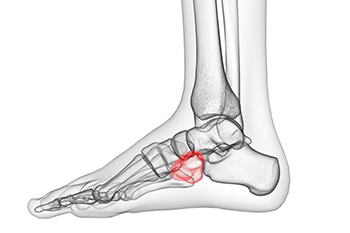
Cuboid syndrome occurs when the cuboid bone in the foot becomes partially dislocated, a situation known as subluxation. The cuboid bone is located on the outer side of the foot, between the heel and the base of the fourth and fifth toes, playing a vital role in stabilizing the foot and supporting movement. Causes of cuboid syndrome include sudden injuries like ankle sprains, repetitive stress from activities like running or jumping, and wearing poorly fitting shoes that place extra pressure on the foot. Symptoms typically involve pain on the outer side of the foot, difficulty walking, tenderness, and swelling. Sometimes the pain can radiate into the toes or up the leg. If you have pain in this part of your foot, it is suggested that you consult a podiatrist who can accurately diagnose and offer treatment options.
Cuboid syndrome, also known as cuboid subluxation, occurs when the joints and ligaments near the cuboid bone in the foot become torn. If you have cuboid syndrome, consult with one of our podiatrists from New York Foot and Ankle. Our doctors will assess your condition and provide you with quality foot and ankle treatment.
Cuboid syndrome is a common cause of lateral foot pain, which is pain on the outside of the foot. The condition may happen suddenly due to an ankle sprain, or it may develop slowly overtime from repetitive tension through the bone and surrounding structures.
Causes
The most common causes of cuboid syndrome include:
- Injury – The most common cause of this ailment is an ankle sprain.
- Repetitive Strain – Tension placed through the peroneus longus muscle from repetitive activities such as jumping and running may cause excessive traction on the bone causing it to sublux.
- Altered Foot Biomechanics – Most people suffering from cuboid subluxation have flat feet.
Symptoms
A common symptom of cuboid syndrome is pain along the outside of the foot which can be felt in the ankle and toes. This pain may create walking difficulties and may cause those with the condition to walk with a limp.
Diagnosis
Diagnosis of cuboid syndrome is often difficult, and it is often misdiagnosed. X-rays, MRIs and CT scans often fail to properly show the cuboid subluxation. Although there isn’t a specific test used to diagnose cuboid syndrome, your podiatrist will usually check if pain is felt while pressing firmly on the cuboid bone of your foot.
Treatment
Just as the range of causes varies widely, so do treatments. Some more common treatments are ice therapy, rest, exercise, taping, and orthotics.
If you have any questions, please feel free to contact one of our offices located in Franklin Square, Bethpage, Brooklyn, and Massapequa, NY . We offer the newest diagnostic and treatment technologies for all your foot care needs.
Definition and Risk Factors of Heel Spurs
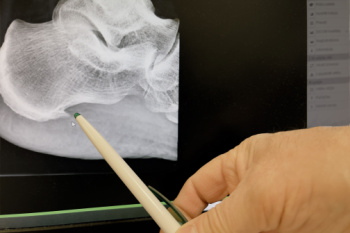
A heel spur is a bony growth that forms on the underside of the heel bone, often linked with long-term strain on foot muscles and ligaments. It develops when calcium deposits build up over time, creating a pointed projection that can cause heel pain, especially during walking or standing. Heel spurs are commonly associated with plantar fasciitis, a condition involving inflammation of the connective tissue along the bottom of the foot. Diagnosis is typically confirmed through physical examination and imaging studies like X-rays. Contributing causes include repetitive stress from activities like running, wearing unsupportive footwear, or having flat feet or high arches. Risk factors include aging, obesity, and occupations that involve prolonged standing. If you have heel pain, it is suggested that you schedule an appointment with a podiatrist who can accurately diagnose and treat heel spurs.
Heel spurs can be incredibly painful and sometimes may make you unable to participate in physical activities. To get medical care for your heel spurs, contact one of our podiatrists from New York Foot and Ankle. Our doctors will do everything possible to treat your condition.
Heels Spurs
Heel spurs are formed by calcium deposits on the back of the foot where the heel is. This can also be caused by small fragments of bone breaking off one section of the foot, attaching onto the back of the foot. Heel spurs can also be bone growth on the back of the foot and may grow in the direction of the arch of the foot.
Older individuals usually suffer from heel spurs and pain sometimes intensifies with age. One of the main condition's spurs are related to is plantar fasciitis.
Pain
The pain associated with spurs is often because of weight placed on the feet. When someone is walking, their entire weight is concentrated on the feet. Bone spurs then have the tendency to affect other bones and tissues around the foot. As the pain continues, the feet will become tender and sensitive over time.
Treatments
There are many ways to treat heel spurs. If one is suffering from heel spurs in conjunction with pain, there are several methods for healing. Medication, surgery, and herbal care are some options.
If you have any questions feel free to contact one of our offices located in Franklin Square, Bethpage, Brooklyn, and Massapequa, NY . We offer the latest in diagnostic and treatment technology to meet your needs.
Sesamoiditis Facts
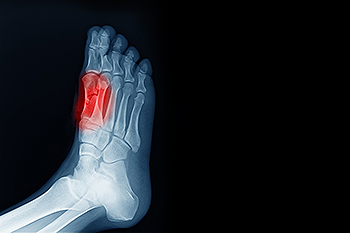
Sesamoiditis is an inflammatory condition that affects the small sesamoid bones beneath the big toe joint, often causing pain at the ball of the foot. These bones act like pulleys, helping the tendons move smoothly and bear the stress of walking, running, or jumping. When repetitive pressure or trauma irritates the area, pain can develop beneath the big toe, especially when bending or pushing off the foot. Symptoms of sesamoiditis include swelling, tenderness, and difficulty walking, sometimes leading to a limping gait to avoid pressure on the forefoot. Although sesamoiditis is not life-threatening, it can disrupt daily activities. A podiatrist can confirm the diagnosis, recommend footwear modifications, and may prescribe custom orthotics to relieve pressure on the joint. Further treatment such as immobilization or surgery may be necessary in severe cases. If you are experiencing pain beneath your big toe, it is suggested that you make an appointment with a podiatrist for a diagnosis and treatment.
Sesamoiditis is an unpleasant foot condition characterized by pain in the balls of the feet. If you think you’re struggling with sesamoiditis, contact one of our podiatrists of New York Foot and Ankle. Our doctors will treat your condition thoroughly and effectively.
Sesamoiditis
Sesamoiditis is a condition of the foot that affects the ball of the foot. It is more common in younger people than it is in older people. It can also occur with people who have begun a new exercise program, since their bodies are adjusting to the new physical regimen. Pain may also be caused by the inflammation of tendons surrounding the bones. It is important to seek treatment in its early stages because if you ignore the pain, this condition can lead to more serious problems such as severe irritation and bone fractures.
Causes of Sesamoiditis
- Sudden increase in activity
- Increase in physically strenuous movement without a proper warm up or build up
- Foot structure: those who have smaller, bonier feet or those with a high arch may be more susceptible
Treatment for sesamoiditis is non-invasive and simple. Doctors may recommend a strict rest period where the patient forgoes most physical activity. This will help give the patient time to heal their feet through limited activity. For serious cases, it is best to speak with your doctor to determine a treatment option that will help your specific needs.
If you have any questions please feel free to contact one of our offices located in Franklin Square, Bethpage, Brooklyn, and Massapequa, NY . We offer the newest diagnostic and treatment technologies for all your foot and ankle needs.
Why Live with Pain and Numbness in Your Feet?
Differences Between Bruised and Broken Toes
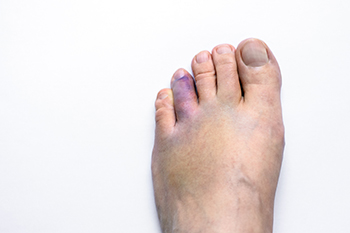
A bruised toe and a broken toe can cause pain and discomfort, but they have distinct differences. A bruised toe occurs when direct impact or pressure damages the small blood vessels under the skin, leading to discoloration, tenderness, swelling, and mild difficulty in movement. The pain is usually manageable, and mobility is often preserved. A broken toe results from a more severe injury, such as heavy impact or sudden force, causing a fracture in the bone. Symptoms include severe pain, swelling, bruising, difficulty moving the toe, and sometimes a visible deformity. A popping sound may be heard at the time of injury. While bruised toes typically heal with rest, broken toes often require medical evaluation. If you have injured your toe, it is suggested that you contact a podiatrist who can accurately diagnose bruised and broken toes, and offer appropriate treatment solutions.
Broken toes may cause a lot of pain and should be treated as soon as possible. If you have any concerns about your feet, contact one of our podiatrists from New York Foot and Ankle. Our doctors will treat your foot and ankle needs.
What Is a Broken Toe?
A broken toe occurs when one or more of the toe bones of the foot are broken after an injury. Injuries such as stubbing your toe or dropping a heavy object on it may cause a toe fracture.
Symptoms of a Broken Toe
- Swelling
- Pain (with/without wearing shoes)
- Stiffness
- Nail Injury
Although the injured toe should be monitored daily, it is especially important to have a podiatrist look at your toe if you have severe symptoms. Some of these symptoms include worsening or new pain that is not relieved with medication, sores, redness, or open wounds near the toe.
If you have any questions, please feel free to contact one of our offices located in Franklin Square, Bethpage, Brooklyn, and Massapequa, NY . We offer the newest diagnostic and treatment technologies for all your foot care needs.
Stretches That Help With Plantar Fasciitis
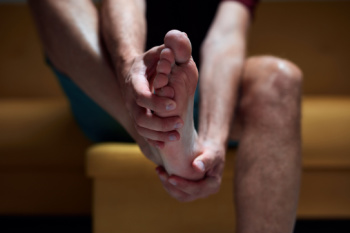
Plantar fasciitis causes pain in the heel, arch, and bottom of the foot, often making it difficult for people to walk comfortably, especially after periods of rest. Stretching the feet, toes, and ankles can help reduce discomfort by easing pressure on the plantar fascia, a band of tissue under the foot that supports the arch. Simple stretches, such as gently pulling the toes back while seated or rolling the foot over a round object, can improve flexibility and reduce strain on the plantar fascia. These plantar fasciitis exercises are most effective when done regularly and may support healing by loosening tight muscles and promoting better foot function. Continuing the stretches even after pain recedes may help lower the risk of recurrence. Warming up before physical activity and stretching the calf muscles afterward can also improve foot mechanics. Supportive footwear plays an important role in protecting the arch during daily movement. A podiatrist can diagnose plantar fasciitis and recommend exercises as well as footwear that support recovery. If you have foot pain associated with plantar fasciitis, it is suggested that you schedule an appointment with a podiatrist for an exam and appropriate treatment.
Plantar fasciitis can be very painful and inconvenient. If you are experiencing heel pain or symptoms of plantar fasciitis, contact one of our podiatrists from New York Foot and Ankle. Our doctors can provide the care you need to keep you pain-free and on your feet.
What Is Plantar Fasciitis?
Plantar fasciitis is the inflammation of the thick band of tissue that runs along the bottom of your foot, known as the plantar fascia, and causes mild to severe heel pain.
What Causes Plantar Fasciitis?
- Excessive running
- Non-supportive shoes
- Overpronation
- Repeated stretching and tearing of the plantar fascia
How Can It Be Treated?
- Conservative measures – anti-inflammatories, ice packs, stretching exercises, physical therapy, orthotic devices
- Shockwave therapy – sound waves are sent to the affected area to facilitate healing and are usually used for chronic cases of plantar fasciitis
- Surgery – usually only used as a last resort when all else fails. The plantar fascia can be surgically detached from the heel
While very treatable, plantar fasciitis is definitely not something that should be ignored. Especially in severe cases, speaking to your doctor right away is highly recommended to avoid complications and severe heel pain. Your podiatrist can work with you to provide the appropriate treatment options tailored to your condition.
If you have any questions please feel free to contact one of our offices located in Franklin Square, Bethpage, Brooklyn, and Massapequa, NY . We offer the newest diagnostic and treatment technologies for all your foot and ankle needs.
Foot and Ankle Stretches for Preventing Running Injuries

Stretching the feet and ankles is essential for maintaining flexibility, strength, and injury prevention in runners. Regular stretching improves mobility, reduces strain on muscles, and enhances overall performance. A simple exercise that strengthens foot muscles involves picking up small objects, such as marbles or coins, with the toes, improving grip and control. The balancing act helps with stability by standing on one foot for several seconds, gradually increasing time to enhance ankle strength and coordination. Plantar stretching targets the arch by placing one foot against a wall with toes pointing upward while gently leaning forward to stretch the sole. If you have endured a foot or ankle injury while running, it is suggested that you contact a podiatrist who can treat various foot and ankle conditions, and recommend additional running injury prevention stretches.
Exercising your feet regularly with the proper foot wear is a great way to prevent injuries. If you have any concerns about your feet, contact one of our podiatrists of New York Foot and Ankle. Our doctors will treat your foot and ankle needs.
How to Prevent Running Injuries
Many common running injuries are caused by overuse and overtraining. When the back of the kneecap starts wearing out and starts causing pain in your knee, this is commonly referred to as runner’s knee. Runner’s knee is a decrease in strength in your quadriceps and can occur if you’re not wearing properly fitted or supporting shoes. To prevent runner’s knee, focusing on hip strengthening is a good idea, as well as strengthening your quads to keep the kneecaps aligned.
What Are Some Causes of Running Injuries?
- One cause of a common running injury is called iliotibial band syndrome.
- Plantar fasciitis is also another common injury.
- Stress fractures can occur from overtraining, lack of calcium, or even your running style.
Best Ways to Prevent Running Injuries
- Wear footwear that fits properly and suits your running needs.
- Running shoes are the only protective gear that runners have to safeguard them from injury.
- Make a training schedule. Adding strengthening exercises as well as regular stretching can help keep you strong and limber and can lessen the possibility of injuries.
- Stretching keeps muscles limber; this will help you gain better flexibility.
If you have any questions please feel free to contact one of our offices located in Franklin Square, Bethpage, Brooklyn, and Massapequa, NY . We offer the newest diagnostic and treatment technologies for all your foot and ankle needs.
Causes of Pain on the Bottom of the Foot While Walking
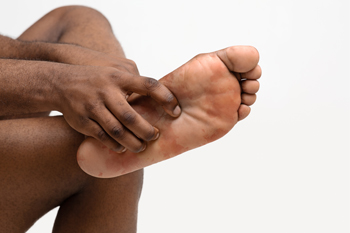
Pain on the bottom of the foot while walking can result from several conditions affecting the nerves, bones, and soft tissues. Metatarsalgia occurs when the ball of the foot experiences excessive pressure, leading to inflammation and discomfort. Peripheral neuropathy, often linked to diabetes, causes nerve damage that leads to tingling, burning, or sharp pain. Morton's neuroma is a thickening of nerve tissue between the toes, creating a sensation similar to stepping on a pebble. Additionally, sesamoiditis, an inflammation of the small sesamoid bones beneath the big toe, can cause pain with every step. If you have foot pain, it is suggested that you consult a podiatrist who can determine what the cause is, and offer effective relief and treatment solutions.
Foot Pain
Foot pain can be extremely painful and debilitating. If you have a foot pain, consult with one of our podiatrists from New York Foot and Ankle. Our doctors will assess your condition and provide you with quality foot and ankle treatment.
Causes
Foot pain is a very broad condition that could be caused by one or more ailments. The most common include:
- Bunions
- Hammertoes
- Plantar Fasciitis
- Bone Spurs
- Corns
- Tarsal Tunnel Syndrome
- Ingrown Toenails
- Arthritis (such as Gout, Rheumatoid, and Osteoarthritis)
- Flat Feet
- Injury (from stress fractures, broken toe, foot, ankle, Achilles tendon ruptures, and sprains)
- And more
Diagnosis
To figure out the cause of foot pain, podiatrists utilize several different methods. This can range from simple visual inspections and sensation tests to X-rays and MRI scans. Prior medical history, family medical history, and any recent physical traumatic events will all be taken into consideration for a proper diagnosis.
Treatment
Treatment depends upon the cause of the foot pain. Whether it is resting, staying off the foot, or having surgery; podiatrists have a number of treatment options available for foot pain.
If you have any questions, please feel free to contact one of our offices located in Franklin Square, Bethpage, Brooklyn, and Massapequa, NY . We offer the newest diagnostic and treatment technologies for all your foot care needs.
Do Your Child's Feet Hurt?
Causes and Symptoms of Ankle Sprains
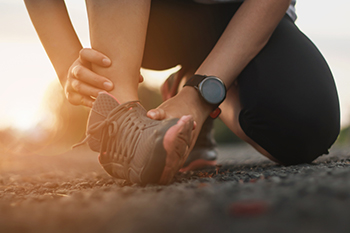
An ankle sprain can happen to anyone when the foot twists, rolls, or turns awkwardly, causing the ligaments to stretch beyond their limits. Ankle sprains often occur during sudden movements, such as stepping on an uneven surface, missing a step, or landing improperly from a jump. The ligaments on the outer side of the ankle are most commonly affected. Symptoms include pain, swelling, bruising, tenderness, and difficulty bearing weight on the injured foot. Some people hear a popping sound at the moment of injury, and severe sprains may result in joint instability. Those who participate in sports or have had previous ankle sprains are more likely to experience this injury, but even everyday activities can lead to a sprain. Without proper care, repeated sprains can weaken the ligaments, increasing the risk of your ankle giving way during daily activities. A podiatrist can evaluate the severity of the sprain, ensure there are no fractures, and recommend treatment to promote healing and prevent complications. If you believe you have sprained an ankle, it is suggested that you make an immediate appointment with a podiatrist for an exam, diagnosis, and treatment.
Ankle sprains are common but need immediate attention. If you need your feet checked, contact one of our podiatrists from New York Foot and Ankle. Our doctors can provide the care you need to keep you pain-free and on your feet.
How Does an Ankle Sprain Occur?
Ankle sprains take place when the ligaments in your ankle are torn or stretched beyond their limits. There are multiple ways that the ankle can become injured, including twisting or rolling over onto your ankle, putting undue stress on it, or causing trauma to the ankle itself.
What Are the Symptoms?
- Mild to moderate bruising
- Limited mobility
- Swelling
- Discoloration of the skin (depending on severity)
Preventing a Sprain
- Wearing appropriate shoes for the occasion
- Stretching before exercises and sports
- Knowing your limits
Treatment of a Sprain
Treatment of a sprain depends on the severity. Many times, people are told to rest and remain off their feet completely, while others are given an air cast. If the sprain is very severe, surgery may be required.
If you have suffered an ankle sprain previously, you may want to consider additional support such as a brace and regular exercises to strengthen the ankle.
If you have any questions please feel free to contact one of our offices located in Franklin Square, Bethpage, Brooklyn, and Massapequa, NY . We offer the newest diagnostic and treatment technologies for all your foot and ankle needs.
More...
The Importance of Diabetic Foot Care
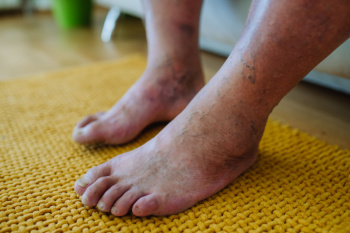
Proper foot care is essential for individuals with diabetes to prevent serious complications. Keeping the feet clean by washing them daily with mild soap and warm water helps reduce the risk of infections. Thoroughly drying the feet, especially between the toes, prevents excess moisture that can lead to fungal infections. Moisturizing dry skin is important to prevent cracks that may allow bacteria to enter. Regularly inspecting the feet for cuts, blisters, or changes in skin color can help detect problems early. Practicing healthy foot habits, such as wearing well-fitted shoes and avoiding walking barefoot, reduces the risk of injuries. Poor circulation and nerve damage associated with diabetes make foot care a priority. If you have diabetes, it is strongly suggested that you are under the care of a podiatrist who can help you to manage this serious condition.
Diabetic foot care is important in preventing foot ailments such as ulcers. If you are suffering from diabetes or have any other concerns about your feet, contact one of our podiatrists from New York Foot and Ankle. Our doctors can provide the care you need to keep you pain-free and on your feet.
Diabetic Foot Care
Diabetes affects millions of people every year. The condition can damage blood vessels in many parts of the body, especially the feet. Because of this, taking care of your feet is essential if you have diabetes, and having a podiatrist help monitor your foot health is highly recommended.
The Importance of Caring for Your Feet
- Routinely inspect your feet for bruises or sores.
- Wear socks that fit your feet comfortably.
- Wear comfortable shoes that provide adequate support.
Patients with diabetes should have their doctor monitor their blood levels, as blood sugar levels play such a huge role in diabetic care. Monitoring these levels on a regular basis is highly advised.
It is always best to inform your healthcare professional of any concerns you may have regarding your feet, especially for diabetic patients. Early treatment and routine foot examinations are keys to maintaining proper health, especially because severe complications can arise if proper treatment is not applied.
If you have any questions please feel free to contact one of our offices located in Franklin Square, Bethpage, Brooklyn, and Massapequa, NY . We offer the newest diagnostic and treatment technologies for all your foot and ankle needs.
Cracked Heels and Their Link to Health Issues
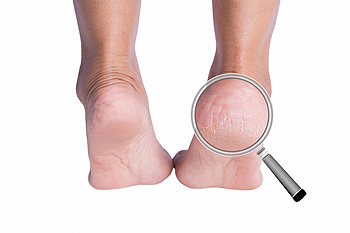
Cracked heels refer to the painful and dry fissures that form on the skin of the heel, often accompanied by thickened skin. These cracks can develop when the skin loses moisture, causing it to become dry and brittle. Common causes include standing for long periods of time, wearing open-back shoes, and neglecting foot care. Cracked heels can lead to infections if the cracks are deep and expose the underlying tissue to bacteria. People with diabetes may be more susceptible to cracked heels due to poor circulation and nerve damage, which can result in dry skin and reduced ability to heal. If you have developed cracked heels, it is suggested that you consult a podiatrist who can offer effective relief and treatment solutions, which may include prescribed medication.
If the skin on your feet starts to crack, you may want to see a podiatrist to find treatment. If you have any concerns, contact one of our podiatrists from New York Foot and Ankle. Our doctors can provide the care you need to keep you pain-free and on your feet.
Cracked Heels
It is important to moisturize your cracked heels in order to prevent pain, bleeding, and infection. The reason cracked heels form is because the skin on the foot is too dry to support the immense pressure placed on them. When the foot expands, the dry skin on the foot begins to split.
Ways to Help Heal Them
- Invest in a good foot cream
- Try Using Petroleum Jelly
- Ease up on Soaps
- Drink Plenty of Water
Ways to Prevent Cracked Heels
- Moisturize After Showering
- Skip a Shower
- Keep Shower Water Lukewarm
- Don’t Scrub Your Feet
If you are unsure how to proceed in treating cracked heels, seek guidance from a podiatrist. Your doctor will help you with any questions or information you may need.
If you have any questions, please feel free to contact one of our offices located in Franklin Square, Bethpage, Brooklyn, and Massapequa, NY . We offer the newest diagnostic and treatment technologies for all your foot care needs.
Symptoms and Causes of Heel Pad Syndrome
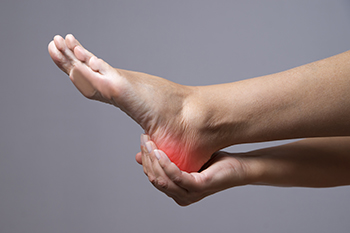
Heel pad syndrome occurs when the protective fat pad beneath the heel thins or loses its elasticity, reducing the ability to absorb impact. This can result in deep, aching pain at the center of the heel, particularly when walking, standing, or engaging in high-impact activities. Some people describe a bruised sensation, which may worsen when walking barefoot or on hard surfaces. Repetitive stress, prolonged standing, excess body weight, and aging can contribute to the deterioration of the heel pad. Wearing inappropriate footwear and conditions that affect soft tissue integrity, such as diabetes or arthritis, may also play a role in developing heel pad syndrome. A podiatrist can evaluate the condition by examining your heel and assessing fat pad thickness. Diagnostic imaging may be used to differentiate heel pad syndrome from other sources of heel pain, like plantar fasciitis or stress fractures. Treatment options for heel pad syndrome include footwear modifications, custom orthotics, or cushioning inserts to support the heel and reduce discomfort. If you are experiencing pain on the bottom of the heel, it is suggested that you schedule an appointment with a podiatrist for a diagnosis and treatment options.
Many people suffer from bouts of heel pain. For more information, contact one of our podiatrists of New York Foot and Ankle. Our doctors can provide the care you need to keep you pain-free and on your feet.
Causes of Heel Pain
Heel pain is often associated with plantar fasciitis. The plantar fascia is a band of tissues that extends along the bottom of the foot. A rip or tear in this ligament can cause inflammation of the tissue.
Achilles tendonitis is another cause of heel pain. Inflammation of the Achilles tendon will cause pain from fractures and muscle tearing. Lack of flexibility is also another symptom.
Heel spurs are another cause of pain. When the tissues of the plantar fascia undergo a great deal of stress, it can lead to ligament separation from the heel bone, causing heel spurs.
Why Might Heel Pain Occur?
- Wearing ill-fitting shoes
- Wearing non-supportive shoes
- Weight change
- Excessive running
Treatments
Heel pain should be treated as soon as possible for immediate results. Keeping your feet in a stress-free environment will help. If you suffer from Achilles tendonitis or plantar fasciitis, applying ice will reduce the swelling. Stretching before an exercise like running will help the muscles. Using all these tips will help make heel pain a condition of the past.
If you have any questions please contact one of our offices located in Franklin Square, Bethpage, Brooklyn, and Massapequa, NY . We offer the newest diagnostic and treatment technologies for all your foot and ankle needs.



